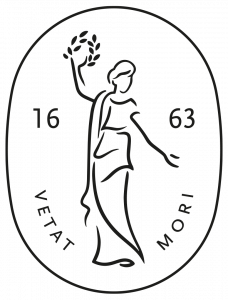The five
Academies
The Institut de France is a non-profit that provides the five academies with a harmonious framework to further the advancement of the arts, humanities, and sciences. Each of the five academies is assigned a given day of the week to utilize the public spaces of the Institute to hold their weekly sessions, awards ceremonies, seminars, and conferences: Monday is for the Académie des Sciences Morales et Politiques, Tuesday is for Académie des Sciences, Wednesday is for the Académie des Beaux-Arts, Thursday is the turn of the Académie Française and Friday is for the Académie des Inscriptions et Belles-Lettres.
During the course of the year, during official ceremonies under the Cupola, the Academicians wear the habit vert (green tailcoat), which is black and embroidered with green and gold olive branches despite its name. The majority of the Academicians also wear the ceremonial sword, some of which are works of art customized with personalized symbols.
L’Académie française


Founded by Cardinal Richelieu in 1635, the forty Academicians of the Académie Française (Academy of the French Language) monitor and protect the French language. Their original mandate is “to apply certain rules to our language, and render it pure, eloquent and capable of serving the arts and sciences.” They accomplish their mission through the publication of the official dictionary and the promotion of the French language throughout the world.
—
Permanent Secretary: Amin Maalouf
Académie des
inscriptions et belles-lettres

The Académie des Inscriptions et Belles-Lettres (Academy of Literature and the Humanities) was founded in 1663 by Jean-Baptiste Colbert, the finance minister to King Louis XIV, to promote the advancement and dissemination of historical and philological knowledge in the fields of classical antiquity, oriental studies, and the period from the Middle Ages to the Classical Age. The Académie des Inscriptions et Belles-Lettres scope has grown to include the study of other civilizations (the Amerindian world) and general linguistics. It provides advice and expert opinion to public authorities, funds research, and has a distinguished record of scholarly publication. It has 55 Academicians, 40 foreign associates, and 100 French and foreign correspondents.
—
Permanent Secretary: Nicolas Grimal


Académie des sciences

The Académie des Sciences (Academy of Science), founded in 1666 by Jean-Baptiste Colbert, is an assembly of some of the most eminent French and foreign scientific specialists. Through their discussions and debates, Académie des sciences creates an expert framework and warning system for the political, ethical, and societal ramifications of science. Their goal is to encourage the use of science to help citizens make better decisions and provide the government with scientific expertise and recommendations. The Académie des sciences comprises 282 Academicians, 114 foreign associates, and 70 correspondents.
—
Permanent Secretaries: Antoine Triller and Étienne Ghys
Académie des beaux-arts


The Académie des beaux-arts (Academy of Fine Arts) assumed its present form in 1816 when the Académie de Peinture et de Sculpture (Academy of Painting and Sculpture, founded 1648), the Académie de Musique (Academy of Music, founded in 1669), and the Académie d’Architecture (Academy of Architecture, founded in 1671) merged.
With 63 Academicians in 9 sections, the Académie des Beaux-Arts promotes and encourages artistic creativity in all its forms and promotes French cultural heritage. The Académie des Beaux-Arts supports creativity by awarding annual prizes, partnerships with cultural institutions, and advising the government and public authorities.
—
Permanent Secretary: Laurent Petitgirard
Académie des sciences morales et politiques

Born out of the Age of Enlightenment, established in its present form by the French historian, orator, and statesman François Pierre Guillaume Guizot in 1832, the Académie des Sciences Morales et Politiques (Academy of Moral, Social and Political Sciences) is the oldest institution of its kind. Combining philosophical, psychological, sociological, legal, economic, political, historical, and geographical perspectives, it offers a space for free and informed discussion of all issues affecting the future of society to encourage the reflection of citizens and the government. It has 50 Academicians, 12 foreign associates, and 60 correspondent members, who include academics and political, economic, judicial, social, and cultural luminaries, all united in their uncompromising commitment to intellectual rigor.
—
Permanent Secretary: Bernard Stirn








